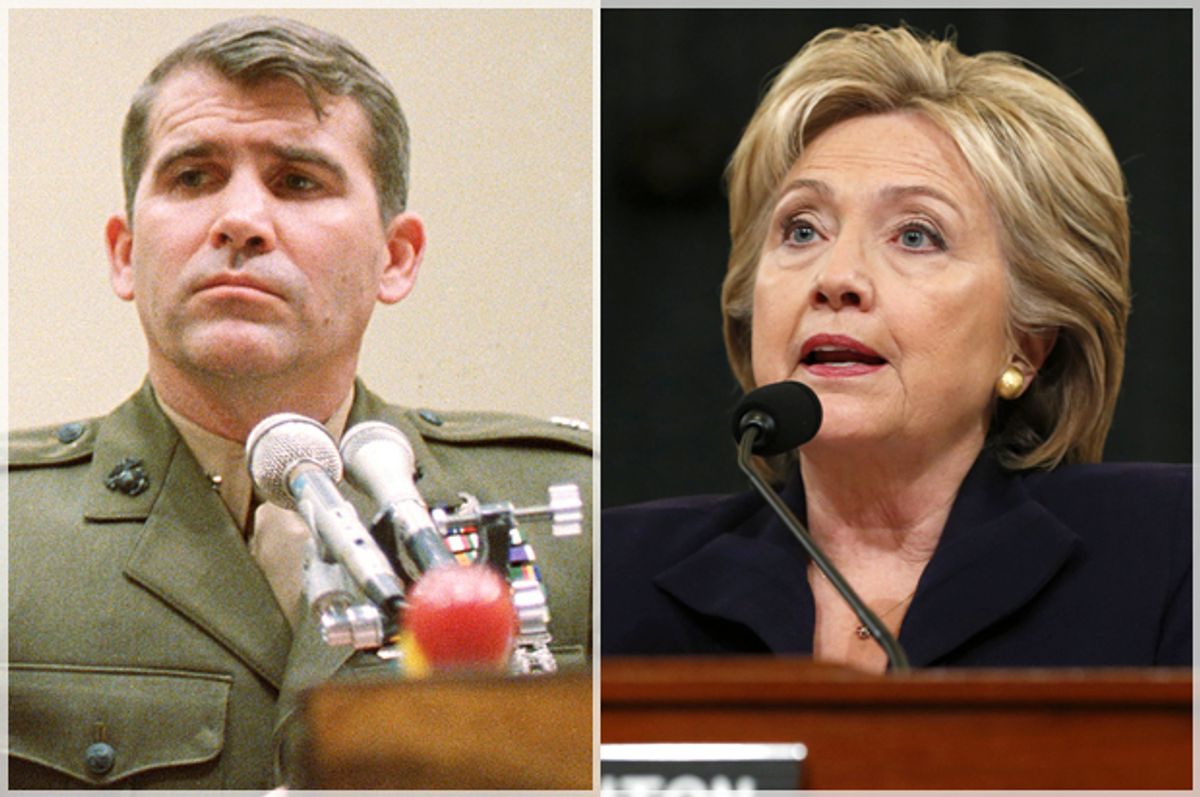It’s not an enviable place to be: Hillary Clinton spent the day dealing with the Benghazi hearing on Capitol Hill, grilled over her role in the 2012 Libyan attacks that left four Americans, including U.S. ambassador Christopher Stevens, dead.
Let’s leave aside for the moment the question of whether Clinton deserves to be investigated over these attacks, which took place thousands of miles from Washington and in which she was not directly involved. A number of people, including some Republicans, have said that the inquiry was designed to score political points. Maybe they’re well-deserved.
But it may be that this kind of videotaped spectacle — and with all the readings of emails and talk about Sydney Blumenthal, this one has hardly been great television, whether we watch on a set or online — tends to do the opposite of what’s often intended. That is, these investigations, more often than investigators think, play to the favor of the person being investigated.
The fact that Hillary Clinton is often more effective when she’s cornered, and that she seems to have retained some of the poise and focus she demonstrated at the Democratic debates, pushes this even more into her column.
The last few decades show a wide range of characters — Oliver North, who appeared on televised hearings in 1987 about his role in Iran-Contra; Clarence Thomas, who went through potentially brutalizing confirmation hearings in 1991 involving sexual harassment charges; and Bill Clinton, who was publicly embroiled in Monica-Gate in 1998 – actually received a boost of support for their appearances defending themselves. Three very different men, three very different transgressions, but North and Thomas became folk heroes, and Clinton’s party actually picked up seats in Congress while his popularity ticked up.
And each man came up with something different to win the audience over: For North it was an earnest, military bearing and attacks on the Washington establishment. For Thomas it was his evocative description of a “high-tech lynching” that made his race explicit. For Bill Clinton it was his usual hangdog charisma. (Arrogant and obnoxious questioners, in some cases, don’t hurt.)
Is there something hardwired into human beings to identify with individuals cornered by large groups of stern, formally dressed men? A memory of schoolyard bullying and defending supposed underdogs? Maybe so. In any case, this one seems to be going Hillary’s way. The New Republic sees the investigations as a win for her:
The first two and a half hours of Hillary Clinton’s testimony before the House Select Committee on Benghazi have presented a contrast between Clinton and her Republican interrogators that they quite clearly didn’t want taking hold in the public imagination.
Clinton: Poised, knowledgable, contrite, humble, clear.
Republicans: Small, petty, uninterested, disjointed, prepossessed.
…At this point, I imagine Republicans must be hoping that over so many hours, and as fatigue sense in, she’ll slip and offer them a single damaging soundbite or decontextualized “gaffe,” and try to use that soundbite to overwhelm the otherwise extremely positive impression she’s making. If she avoids this, she might consider the whole thing an in-kind donation to her presidential campaign.
Additionally, liberal commentators are mocking the GOP attackers in a way that bolsters ideological unity on the left. (“If Hillary Clinton does not know the name of every single person who has ever worked in the State Department,” Wonkette writes, “and is not familiar with every single email ever sent by a State Department employee — especially the incriminating one under tab 31!!! — doesn’t this prove she personally murdered Ambassador Chris Stevens?”) For once, the left side is not divided between Clinton voters and Sanders voters.
Should the GOP have avoided pursuing Hillary Clinton because of the way the hearings would play in public? That’s a separate question. But it looks like she may be the winner here, and it may have less to do with her than the way human empathy works. Anything could happen, but this could be her best day since her confident performance in the Democratic debate.

Shares